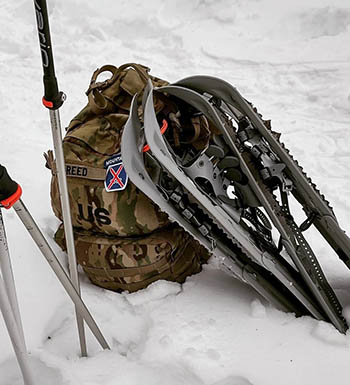Never forget the power of nature and its effects, especially if exploring outdoors during the coldest months of the year.
In wintertime, "hands down, the worst mistake you can make is to underestimate what challenges nature is capable of and overestimate your own abilities," said Army Master Sgt. Daniel Fields.
"These are the root causes of the majority of the troubles that I have seen."
Two crucial aspects of retaining readiness in winter climates are nutrition and liquids uptake, he said. The same safety tips apply to hikers, skiers and campers.
The field packs that infantry troops carry contain more nutrient-dense foods and snacks, for example.
Despite the added nutrients, "soldiers can spiral pretty quickly into hypothermia from the 'shell-core effect,'" Fields said. The shell core effect takes over when soldiers are on the move in the winter. They use up more energy. They sweat in their winter uniforms. If they don't eat or drink, they can become dehydrated, cold and fatigued.
"There is decreased blood flow to the extremities," he explained. "A consequence is cold diuresis, where they urinate more and more frequently," thus becoming more and more dehydrated. Diuresis occurs because the body has to filter more blood through the core to keep warm, thus engaging the kidneys in more urine production as they eliminate toxins.
A slew of other issues can also happen, such as chilblains and frostbite, even when soldiers have been educated about the effects of the cold, Fields noted. That's what training is for: "Sometimes it takes a little while to get them to understand until they're experienced and comfortable working in the cold."
For those dealing with winter's cold temperatures and possibly snow, sleet, or frozen rain, here is Fields' top advice:
- Embrace the extremes of the environment. Don't hide from it.
- Seek every available opportunity to acclimate and train in the cold. This only builds confidence and proficiency.
- Prior to conducting an outdoor winter activity, seek ways to educate yourself about the specific activity.
- Invest in quality outdoor clothing and equipment. The dividends will be priceless.
- Understand the effects of the cold (or altitude) on the body.

Soldiers from the 10th Mountain Division train on cold weather tactics with subject matter experts from the 86th Infantry Brigade Combat Team (Mountain) as part of the annual Mountain Legacy event, Camp Ethan Allen Training Site, Jericho, Vermont, in February 2021 ( Photo by: Army Maj. J. Scott Detweiler, Joint Force Headquarters, Vermont National Guard).
"If soldiers are prepared, mentally and physically, with the proper training and equipment, those units will be extremely effective, year round and in any climate. A soldier well trained and experienced in the cold will also perform at a high level in more hospitable weather," he said.
A soldier trained only in summertime or under ideal conditions will have great difficulty when operating in cold weather, he warned. "In many cases, soldiers and units have an absolute inability to perform effectively in extreme cold."
"When the mercury drops and the snow falls, avoid (when prudent) conducting indoor physical training. Snowshoeing for example, is an excellent opportunity to allow soldiers to become familiar and comfortable with their cold weather uniform and equipment while at the same time conducting physical training," Fields said.
Educational opportunities for wintertime activities exist at many colleges and outdoor recreation groups or co-ops, Fields said. "If you'd like to go backcountry skiing, snowshoeing or camping, for example, take an avalanche awareness course, a wilderness first aid course or even a backcountry camping course.
Avoid tight fitting, restrictive clothing, especially garments made with cotton. "Wear clothing loose and in layers to maximize the benefits of the insulating properties of the clothing."
"Many live by the mantra: 'There is no bad weather, only bad equipment (clothing).'"
Finally, Fields said: "Continually study and learn to recognize the signs and symptoms of cold weather injuries. Most importantly, know how to prevent and treat dehydration, hypothermia, chilblains and frost bite."
Here are some other top tips from the Centers for Disease Control and Prevention for staying safe:
- Bring extra water with you and plan to drink more water when exerting yourself outdoors in the cold.
- Carry a rucksack or backpack filled with nutrient-dense foods, an aluminum blanket, a compass, back-up battery for your cell phone, mirror, rope, utility knife, and first aid kit.
- Carry extra gloves or mittens in case yours get wet.
- Stay on the trails. Off trail, you might not be able to see trunk holes, rocks and other potential hazards.
- Tell someone where you're going, with whom, and when you plan to be back. Create a time when they should alert authorities that you may be lost or injured.
- Be aware of frostbite, which can show up sooner than you think. Never immerse a frostbitten extremity in hot water. Instead, you should gradually warm up the extremity over time to avoid damage to blood vessels and tissues.
- If a heavy snowstorm starts, stay where you are and build a lean-to if you can. Don't wander off, so that rescuers can more easily find you if needed.
- Have a safety kit ready in your car's trunk that includes blankets, protein bars, water, first aid kit, and an auto safety kit that includes flares.
- A colorful rag may be useful to hang out your window so snow plows can see you.
- In an emergency, stay put until help comes if at all possible.